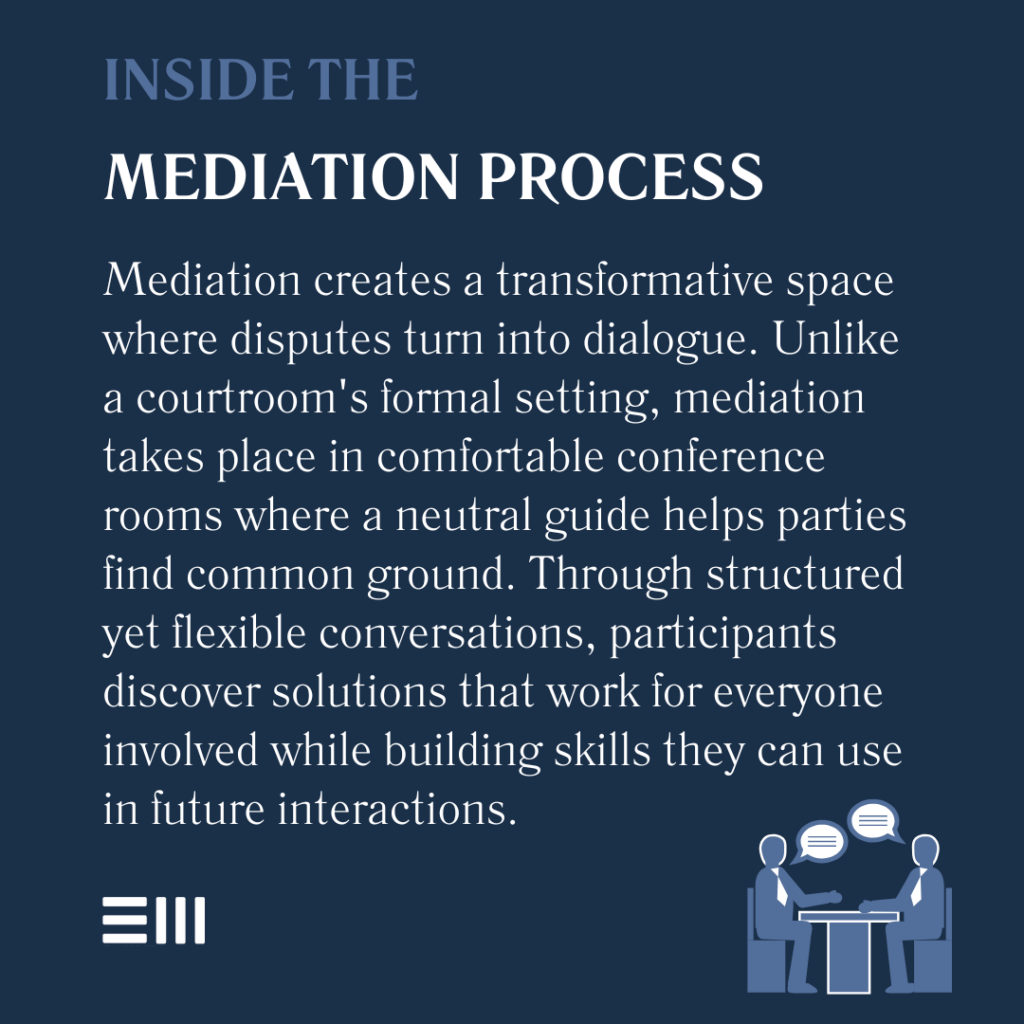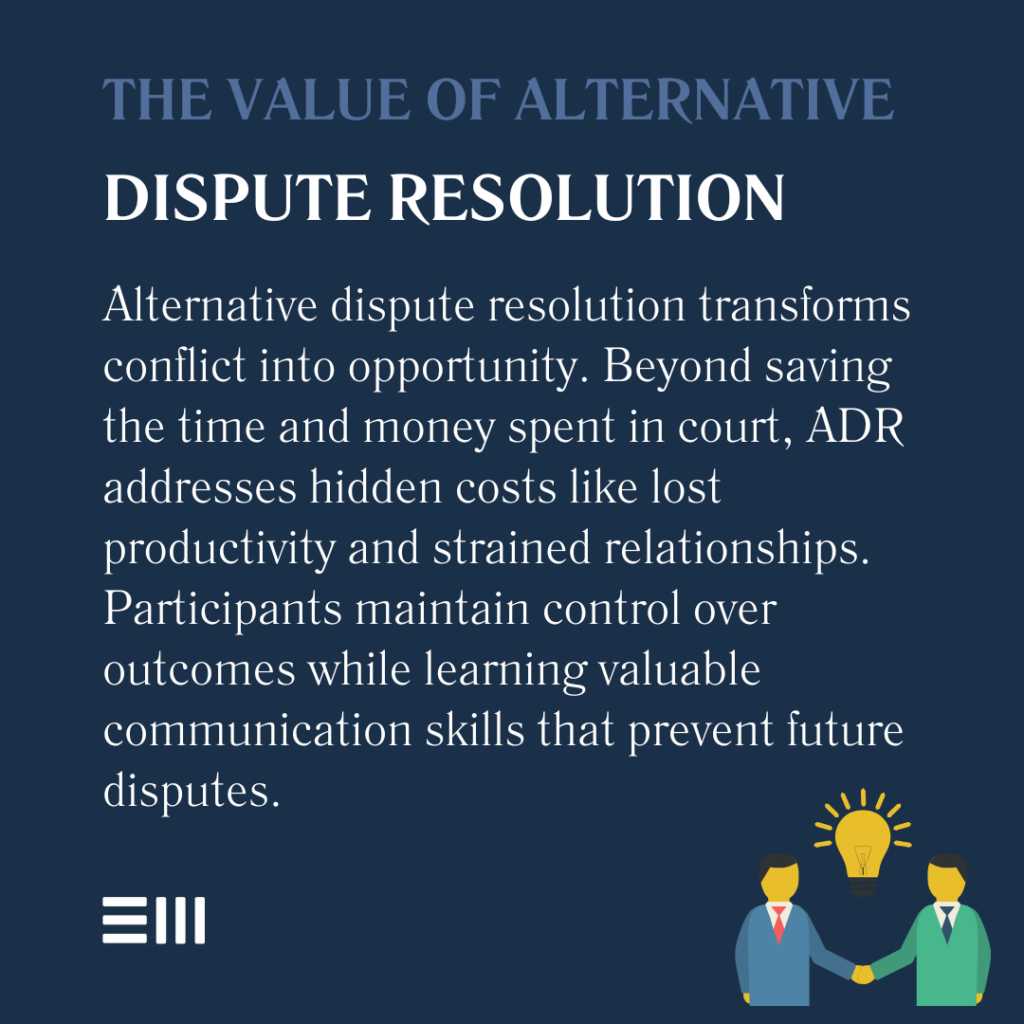
Every Alabama courthouse contains two distinct paths to resolution.
One winds through the traditional courtroom, where judges and juries render decisions.
The other leads to mediation rooms, where parties work together to find common ground.
While both paths can lead to resolution, mediation, and alternative dispute resolution open up possibilities that a courtroom simply cannot offer, from preserving business relationships to finding creative solutions that benefit all parties.
Understanding Mediation and ADR
The path to resolving disputes extends far beyond traditional courtroom litigation. Mediation and alternative dispute resolution (ADR) offer powerful tools for finding common ground and reaching mutually beneficial agreements.
These approaches foster communication and understanding while preserving relationships that might otherwise be damaged through adversarial court proceedings.
Beyond its fundamental principles, mediation brings psychological and social benefits that extend far beyond the immediate resolution of a dispute.
When individuals engage in mediation, they often discover insights about themselves and their situation that would never surface in a courtroom. The process builds conflict resolution skills that serve participants well in future disagreements, whether personal or professional.
The Mediation Process
Mediation creates a structured yet flexible environment where parties can work together to find solutions. A neutral third party guides the conversation while ensuring all voices are heard and respected.
Key elements:
- Voluntary participation from all involved parties;
- Confidential discussions and negotiations;
- Neutral mediator guidance throughout the process;
- Focus on interests rather than positions;
- Creative problem-solving opportunities;
- Preservation of relationships;
- Cost-effective resolution methods; and
- Faster results than traditional litigation.
The success of mediation often lies in its ability to help parties see beyond their immediate positions to understand underlying interests and needs. This deeper understanding frequently leads to more satisfying and lasting agreements.
The mediation environment itself plays a crucial role in fostering resolution. Unlike the imposing formality of a courtroom, mediation typically takes place in comfortable conference rooms designed to put participants at ease.
This setting promotes open dialogue and creative thinking, essential elements for reaching lasting agreements.

Alternative Dispute Resolution Methods
Beyond mediation, ADR encompasses various approaches to conflict resolution. Each method offers unique advantages depending on the nature of your dispute and desired outcomes.
Available Options:
- Arbitration (binding and non-binding);
- Early neutral evaluation;
- Mini-trials;
- Settlement conferences;
- Collaborative law processes;
- Online dispute resolution platforms;
- Facilitated negotiations; and
- Summary jury trials.
Each ADR method brings its own strengths to the table, and many disputes benefit from combining different approaches to achieve optimal results.
Benefits of Choosing ADR
The financial impact of choosing ADR extends beyond immediate legal cost savings. Traditional litigation often carries hidden expenses: lost productivity, damaged business relationships, emotional stress, and missed opportunities.
ADR addresses these indirect costs by providing a swift resolution that allows parties to return their focus to personal and professional growth.
Many participants find that ADR’s educational component proves valuable long after their immediate dispute ends.
Through guided negotiation and professional facilitation, parties learn communication skills and conflict resolution techniques they can apply to future disagreements, often preventing the need for formal intervention altogether.
The privacy afforded by ADR protects more than confidential information—it shields relationships from the public scrutiny that often accompanies courtroom proceedings.
This protection is particularly valuable in business disputes where client confidence and market reputation carry tangible value.
Alternative dispute resolution transforms how we approach conflict resolution, offering advantages that traditional litigation simply cannot match.
Significant advantages:
- Reduced legal costs and expenses;
- Faster resolution timeframes;
- Greater privacy and confidentiality;
- More control over the outcome;
- Improved communication between parties;
- Preserved relationships and dignity;
- Flexible scheduling options;
- Creative solution opportunities;
- Lower stress levels for participants; and
- Enhanced compliance with agreements.
These benefits make ADR particularly valuable for businesses, families, and individuals seeking efficient, cost-effective dispute resolution while maintaining important relationships.

Choosing the Right ADR Method
Selecting the appropriate dispute resolution method requires careful consideration of your specific situation and goals.
Important Factors:
- Nature of the dispute;
- Relationship between parties;
- Desired timeline for resolution;
- Budget constraints;
- Privacy requirements;
- Need for creative solutions;
- Future relationship considerations;
- Complexity of issues involved;
- Power dynamics between parties; and
- Legal requirements and restrictions.
Understanding these factors helps ensure you select the most effective approach for your specific situation.
Common Questions About Mediation and ADR in Alabama
The journey through alternative dispute resolution often raises important questions about the process and its outcomes.
Here are detailed answers to help you better understand your options.
How Long Does the ADR Process Take?
Most mediations conclude within one to three sessions, while other ADR methods typically resolve within weeks rather than the months or years often required for litigation.
What Makes a Good Candidate for Mediation?
Parties willing to communicate openly, listen actively, and work toward mutually beneficial solutions often find the greatest success in mediation.
Can I Still Go to Court if ADR Fails?
Your legal rights remain protected throughout the ADR process, and you maintain the option to pursue litigation if alternative methods don’t produce satisfactory results.
What Role Do Attorneys Play in ADR?
Attorneys can serve as advisors, advocates, or neutral facilitators in ADR processes, helping ensure your interests remain protected while working toward resolution.
How Binding Are ADR Agreements?
Properly documented ADR agreements carry legal weight similar to court orders, though enforcement mechanisms may vary by method and jurisdiction.
The Role of Professional Guidance
Successfully navigating mediation and ADR often requires experienced guidance to help you understand your options and make informed decisions.
Professional support ensures your interests remain protected while working toward resolution.
Take the Next Step Toward Resolution
Your path to dispute resolution doesn’t have to involve lengthy court battles and escalating costs.
While our experienced team can help you explore mediation and ADR options tailored to your specific situation, we firmly believe that personal injury plaintiffs specifically should avoid mediation entirely.
Contact us today to discuss how our experienced team can help you move forward.
Can't find what you're looking for? Search our site below.










